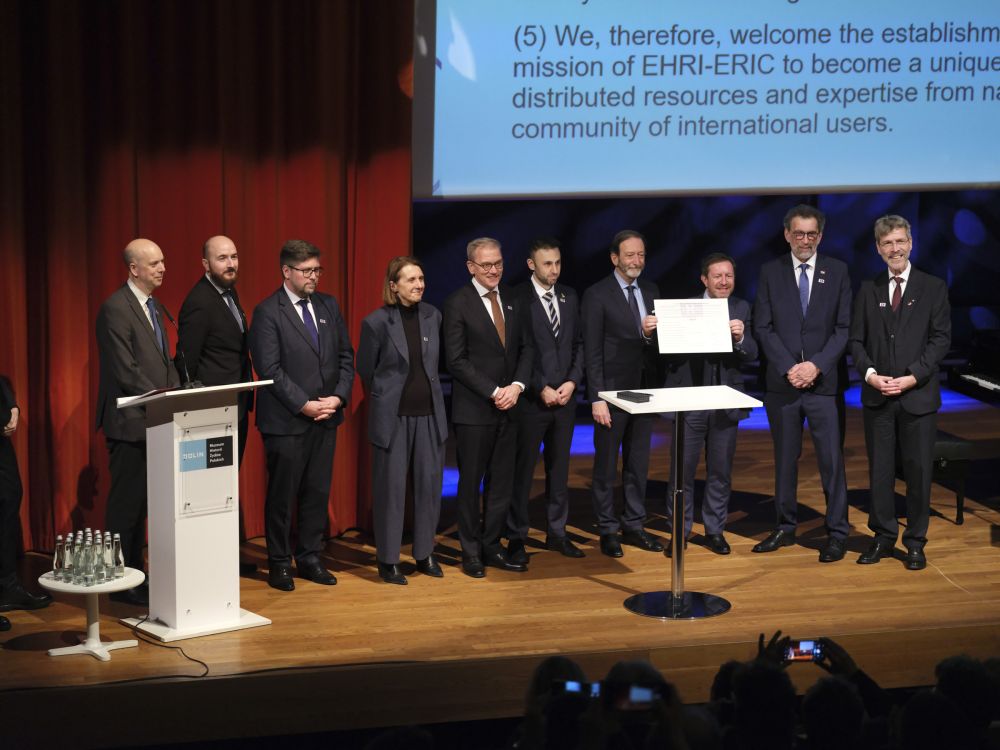- News
- Events
- Oneg Shabbat
- Collections
- Research
- Exhibitions
- Education
- Publishing Department
- Genealogy
- About the Institute
- Bookstore


fot. Grzegorz Kwolek, JHI
EHRI-ERIC is the first international organization bringing together key European institutions involved in Holocaust documentation and research. The Polish coordinator of this structure is the Emanuel Ringelblum Jewish Historical Institute, which, together with the Polish Center for Holocaust Research at the Institute of Philosophy and Sociology of the Polish Academy of Sciences and the Philip Friedman Centre for Jewish Studies at the University of Łódź, has created a national structure within EHRI-ERIC. The Polish EHRI node (EHRI-PL) will be supervised by the Ministry of Culture and National Heritage.
The newly established consortium's goals include providing wide international access to archival sources on the Holocaust, establishing and strengthening cooperation among researchers and scholars of this subject from Poland and abroad, delineating new research directions and methodological approaches, and supporting researchers working on the topic of the Holocaust.
‘Holocaust research is conducted all over the world. The exchange of views and opinions between researchers from different centers is crucial for the development of this sub-discipline of Jewish studies. It is also important because of the dispersion of sources. Materials concerning the Holocaust – whether original documents or elicited sources (such as video testimonies) were collected in Europe, the Americas and Australia. Only an attempt to reach as many important archival collections as possible will allow us to describe the stories from the war period,’ says the director of the Jewish Historical Institute, Dr Michał Trębacz.
The inauguration of the Polish EHRI-PL node began at the Jewish Historical Institute, where several dozens of representatives of academic institutions, museums, ministries and diplomats from European countries, Israel and the United States, as well as representatives of the European Commission and the European Parliament, met.
Our guests visited the permanent and temporary exhibition of the Jewish Historical Institute, guided by Dr Justyna Majewska and Dr Zofia Trębacz from the Research Department. They also had the opportunity to see original documents from the Ringelblum Archive, normally hidden in the Jewish Historical Institute’s vault. The presentation was accompanied by a fascinating story by Agnieszka Reszka and Aleksandra Szarapanowska from the JHI Archive.
The main ceremony inaugurating EHRI-ERIC took place at the Museum of the History of Polish Jews POLIN. The importance of the event was emphasized by the presence of Hanna Wróblewska, Minister of Culture and National Heritage, and Władysław Teofil Bartoszewski, Secretary of State at the Ministry of Foreign Affairs. The Netherlands – host of EHRI-ERIC – was represented by Eppo Bruin, Minister of Education, Culture and Science. Those gathered also had the opportunity to listen to the incredibly moving words of Krystyna Budnicka, Holocaust survivor and Honorary Citizen of Warsaw.
During the ceremony, representatives and representatives of the founding countries of EHRI-ERIC: Austria, Croatia, the Czech Republic, the Netherlands, Israel, Germany, Poland, Romania, Slovakia and the United Kingdom signed an agreement on mutual support for Holocaust research.
![fot. Grzegorz Kwolek, ŻIH (8).jpg [690.05 KB]](https://www.jhi.pl/storage/image/core_files/2025/1/28/fe2f32cba5d3a861fb94870a0c1f0d70/jpg/jhi/preview/fot.%20Grzegorz%20Kwolek,%20ŻIH%20(8).jpg)
The event was highlighted by a performance by violinist Maria Sławek and pianist Piotr Sałajczyk, who performed ‘Nigun’ from Ernest Bloch’s Baal Shem suite, as well as Mieczysław Wajnberg’s ‘Two Songs without Words’.
The fact that the decision to establish an international consortium dealing with the Holocaust was announced in Poland, in Warsaw, is symbolic for at least two reasons. Firstly, Poland is the place where the Holocaust took place. It is on its territory that the former German Nazi extermination camps of Auschwitz-Birkenau or Treblinka are located. Secondly, it was in Poland that the process of documenting and researching the Holocaust was undertaken as early as 1944. The work initiated here is fundamental to our understanding of the tragic fate of Jews during the Second World War.
The event was one of the activities accompanying the Polish Presidency of the Council of the European Union.
You can read more about the activities of the EHRI Polish Node on the project website: www.ehri.pl.